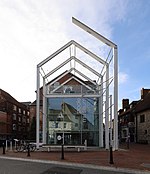Poole United Reformed Church
1777 establishments in EnglandChurches in PooleGrade II* listed churches in DorsetUnited Reformed churches in EnglandUse British English from September 2016

Skinner Street United Reformed Church is the oldest church in Poole, Dorset, England. The current building is the only eighteenth century church building in Poole, and is a Grade II* listed building. The church has a grave for Cyril Coles, one of the gunners in the first tank attack in 1916. The church is used as an adult learning centre.
Excerpt from the Wikipedia article Poole United Reformed Church (License: CC BY-SA 3.0, Authors, Images).Poole United Reformed Church
Skinner Street,
Geographical coordinates (GPS) Address Nearby Places Show on map
Geographical coordinates (GPS)
| Latitude | Longitude |
|---|---|
| N 50.71362 ° | E -1.98371 ° |
Address
Skinner Street United Reformed Church
Skinner Street
BH15 1RH , Old Town
England, United Kingdom
Open on Google Maps











